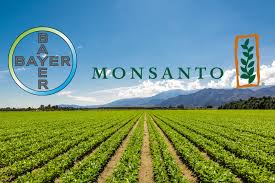A new legal study by University College London urges the European Commission “to take action and to block the proposed merger between Bayer and Monsanto, whether viewed through a narrow competition lens or a wider scope of social and environmental costs”. The study sets out five main reasons why EU competition law requires that the merger be blocked. 1. High market concentration: If the Bayer-Monsanto merger is approved, just three corporations (ChemChina-Syngenta, DuPont-Dow and Bayer-Monsanto) will own and sell about 64% of the world’s pesticides/ herbicides, and 60% of the world’s patented seeds. Thus, the Bayer-Monsanto merger would occur in a market context of even weaker competition.
2. Entrenched market power: Bayer holds 206 patents and Monsanto 119 on transgenic plant traits in the EU, while Monsanto monopolises the US market with 96% of patented cotton traits. The risk of “anticompetitive collusion” is increased by the significant links the firms have, such as cross-licensing agreements, joint ventures, and other R&D strategic alliances.
3. Increased prices for farmers: The merger would “undoubtedly” raise costs and reduce the choice of seeds for farmers, with “considerable effects” on the viability of small

holder farming. Farmers “will pay the price of an increase in concentration in this sector”, pushed into a “take it or leave it” position.
4. Locking farmers in: Monsanto and Bayer’s combined forays into “digital farming” would position it as a fully-integrated service provider. An offer that once accepted would be virtually impossible for farmers to get out of, being dependent on the company for all inputs, down to the very data on their own soils and crops. Farmers would become dependent on three mega-corporations for all important decisions, “ceasing effectively to operate as independent economic actors.”
5. Reduced competition and innovation: The merger would bring together two companies that are direct competitors in some areas, thereby removing competition and the incentive to innovate. The costs of competing with such new one-stop shop platforms may be prohibitively high for small and medium enterprises, which would instead be obliged to sell or license their technology to a merged Bayer-Monsanto corporation, allowing it to control the direction of technological change.
The researchers also call on the European Commission to broaden its investigation of the merger to take into account the full social and ecological costs at stake. For instance, the merger would make farmers less able and likely to farm sustainably. Farmers will increasingly lose control of seed materials, which “will have devastating effects on local varieties and non-standardised agricultural products”. Quantities of pesticides used by farmers can be expected to increase by the oligopoly of agrochemical giants promoting a high-input, high-tech, intensive monoculture model. This would have negative impacts on biodiversity, climate, and health. The political clout of a merged Bayer-Monsanto corporation would drown out alternative voices speaking for agro-ecological farming practices that boost biodiversity.
‘Bad for biodiversity and climate: A decision so critical to the future “control of the global food value chains” cannot justifiably ignore the wider social and ecological costs. And the merger would have profound implications, making farmers less able and likely to farm sustainably: “Investment in seed saving and seed diversity, rather than standardisation of traits, or in non-agro-chemical pest management approaches constitutes a business model that farmers may be less likely to choose, if they are forced to take their advice from the same agro-chem giants.”
Quantities of agricultural inputs like petrochemical-based herbicides and pesticides used by farmers can be expected to increase with the creation an oligopoly of agrochemical giants that have a “material bias” in promoting a high-input, high-tech, intensive monoculture model. This would have negative impacts on biodiversity, climate, and health.
As agriculture becomes “increasingly commoditised”, with critical decisions and inputs outsourced to ‘agriculture solutions’ giants, farmers will increasingly lose control of seed materials, which “will have devastating effects on local varieties and non-standardised agricultural products”.
These findings confirm our fears: at a time of rapid biodiversity loss and the urgent need for seed and crop diversity to make our food systems more resilient to climate change, the Bayer-Monsanto merger is a recipe for disaster. This is particularly the case given the political clout that a merged Bayer-Monsanto corporation would have – drowning out alternative voices speaking of agro-ecological farming practices that boost wildlife rather than destroy it.’
Earlier this year, over 200 civil society organisations called on the European Competition Commissioner to stop the current wave of mergers in the agri-business sector. Over 650,000 citizens have also signed petitions calling for the Commission to act.
The CLES@UCL study urges “the Commission to take action and to block the merger”. Whether viewed through a narrow competition lens or a wider scope of social and environmental costs, the Commission has a legal obligation to reject the Bayer-Monsanto merger. – Third World Network




